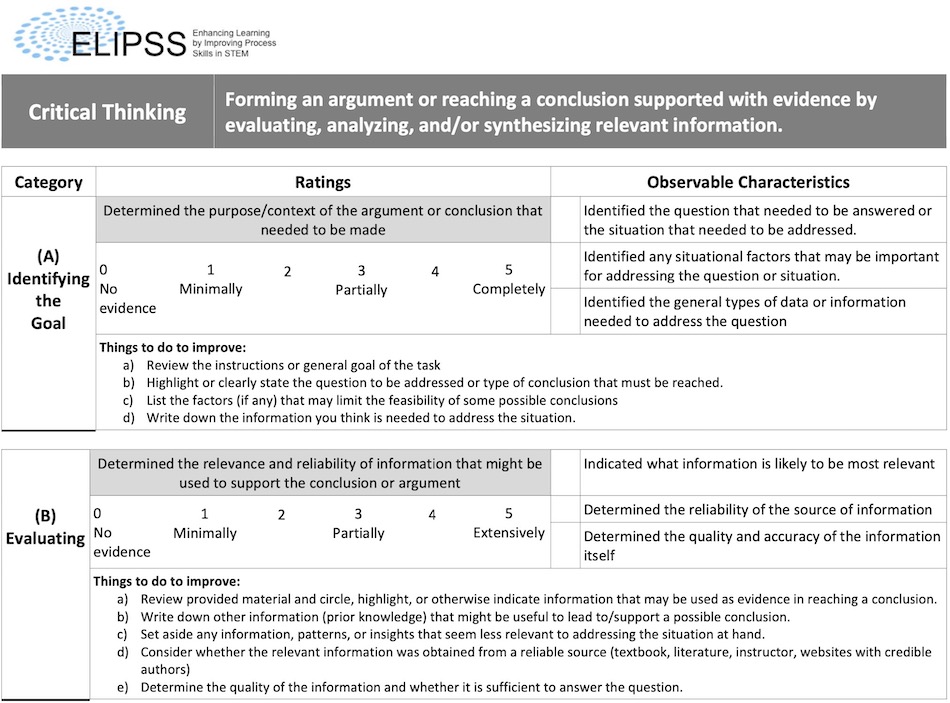Developed by Renee Cole, Juliette Lantz, Suzanne Ruder, Gilbert, Reynders and Courtney Stanford
| Purpose | To assess students’ process skills in active learning undergraduate STEM classroom to support formative assessment. |
|---|---|
| Format | Rubric |
| Duration | N/A min |
| Focus | Scientific reasoning (Critical thinking, Team work, Management, Information processing, Interpersonal communication, Problem solving, Oral/written communication, Metacognition) |
| Level | Upper-level, Intermediate, Intro college |
Example items from the ELIPSS critical thinking rubric:

more details
This is the second highest level of research validation, corresponding to at least 5 of the validation categories below.
Research Validation Summary
Based on Research Into:
- Relevant theory and/or data
Studied Using:
- Iterative use of rubric
- Inter-rater reliability
- Expert review
Research Conducted:
- At multiple institutions
- By multiple research groups
- Peer-reviewed publication
These rubrics went through extensive validation: rubrics were reviewed by researchers, practitioners, and students, iteratively tested in multiple environments (at least 3 courses, at 3 levels, and at 3 institutions), and inter-rater reliability analysis was done with an adjacent agreement score of greater than 80%.
References
- R. Cole, J. Lantz, S. Ruder, G. Reynders, and C. Stanford, Enhancing Learning by Assessing More than Content Knowledge, presented at the ASEE Annual Conference & Exposition, Salt Lake City, Utah, 2018.
- R. Cole, G. Reynders, C. Stanford, and J. Lantz, Constructive Alignment Beyond Content: Assessing Professional Skills in Student Group Interactions and Written Work, presented at the 25th International Conference on Chemistry Education (ICCE), Sydney, New South Wales, Australia, 2018.
- D. Czajka, G. Reynders, C. Stanford, R. Cole, J. Lantz, and S. Ruder, A Novel Rubric Format for Providing Feedback on Process Skills to STEM Undergraduate Students, J. Coll. Sci. Teaching 50 (6), 48 (2021).
- G. Reynders, J. Lantz, S. Ruder, C. Stanford, and R. Cole, Rubrics to assess critical thinking and information processing in undergraduate STEM courses, Int. J. STEM Educ. 7 (1), 15 (2020).
- G. Reynders, E. Suh, R. Cole, and R. Sansom, Developing Student Process Skills in a General Chemistry Laboratory, J. Chem. Educ. 96 (10), 2109 (2019).
We don't have any translations of this assessment yet.
If you know of a translation that we don't have yet, or if you would like to translate this assessment, please contact us!
| Typical Results |
|---|
Because these are rubrics, results vary, so there are no “typical results.” In the papers the developers have published, they give some examples of scores from a variety of contexts. The distribution of scores ranges from 0 and 5, with most students scoring 3s and 4s. |
There are two versions of the ELIPSS Rubrics for each process skill: Analytic and Feedback. The analytic rubric is a “typical” rubric to assess students’ aptitude on a range of process skills. The feedback rubric assesses the same skills as analytic rubrics, but they include more detail such as the types of behaviors that each process skill embodies as well as feedback suggestions for students.



